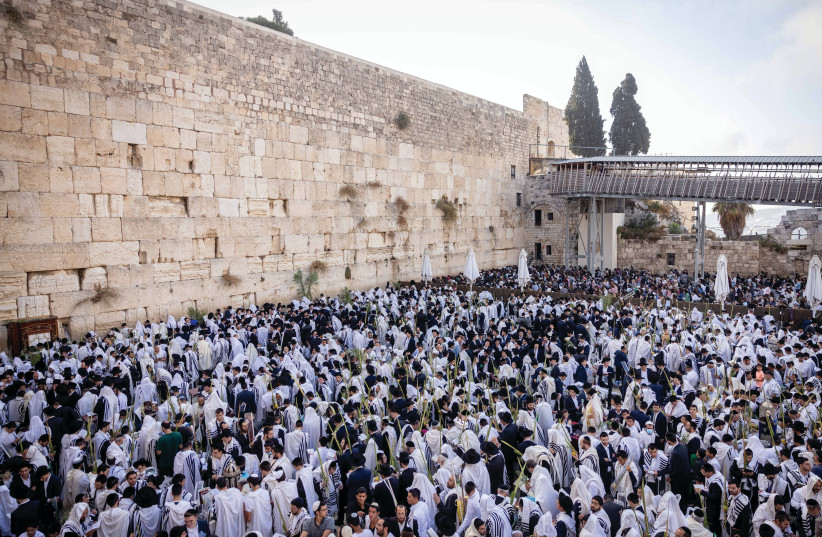One night a couple of weeks into my first trip to Israel on United Synagogue Youth’s summer Israel Pilgrimage program, my counselor, Maury, woke me up from a deep sleep at 4 o’clock in the morning. “We’re going on an adventure,” he said.
As is the case with the best informal educators, Maury was a “special soul” and had connected with me as an educator and mentor from early in the trip. He saw a spiritual side of me that I hadn’t yet understood in myself. So together with a couple of other boys, we got in a cab and sped off. We stopped at Jaffa Gate, and made our way on foot through the hushed alleys of the Old City.
Eventually we made our way down to the Kotel, hearing the hum of various small groups of men praying. As the darkness started to fade, we joined a group toward the back of the men’s section, Maury helping me find the page in my siddur. The number of worshippers began to grow, and the hum and intensity grew louder. Until, unexpectedly, our group paused in our prayers. And then another group paused. And another. There was absolute quiet. Stillness. I looked up at the ancient stones of the wall in front of me. Suddenly a ray of light burst from the top of the wall, as the sun peeked out. And all at once from every group came the simultaneous cry, “Shema Yisrael” as we used this first opportunity to recite the morning Shema at the crack of sunrise.
For me, this was one of just a few rare moments in my life when I’ve experienced full spiritual connection. Even decades later, I remember that moment each time I recite the morning Shema, and a small tremor of holiness runs through me. It is a treasured memory, and I recall clearly the spark of light peeking above the ancient stones, and the sense of wonder and oneness that is possible.
But as I recall that experience, I also realize that I was fortunate. Maury didn’t take any of the girls on the trip with us, because he knew we wouldn’t be able to be together, and the same experience was not available on the women’s side of the Orthodox prayer space that comprises the Kotel plaza.

Today, after many years of struggle, there is a space for egalitarian prayer at the Kotel, but it is separate and unequal. It is in disrepair, intentionally tucked away from the sight of the reigning authorities. Haredi (ultra-Orthodox) groups regularly harass those who come to pray and celebrate in mixed-gender prayer. A compromise that would have recognized Reform and Conservative-Masorti rights, including allowing those movements to be part of governing the space, has been stalled for years. The Kotel can’t help but inspire, but it has also become a symbol of inequality and sinat hinam – the senseless hatred to which the rabbis attribute the destruction of the Temple that once stood above these walls with such holiness and splendor.
It is time for the Israeli government to act to remedy this. Prime Minister Naftali Bennett and his government have the opportunity to implement the Kotel compromise that was drafted in 2016. It required the government to create a space for egalitarian prayer that would make it on par with the two current segregated spaces. And it guaranteed that the Reform and Conservative movements would finally get seats at the table. It was, indeed, a compromise, as it left the current plaza in place and its haredi authorities with control over the existing sections, and moved egalitarian prayer to a new space.
Unfortunately, then-prime minister Benjamin Netanyahu and his haredi partners, after agreeing to the deal, reneged on its implementation. It was a complete betrayal of Netanyahu’s own promises to the vast majority of Jews around the world.
Now this new and diverse coalition, under Bennett’s leadership, has the ability to lead not just the State of Israel, but all of Am Yisrael, in all its diversity, ensuring that all can worship according to their practices, including the large majority of Jews who reject gender separation.
Instead, a small minority within the government have caved to those who spread the ugliest of insults against fellow Jews, and to their threats of violence. Instead of fulfilling their promise to calm the political storms, they have empowered those who stir them up – essentially giving a violent minority a veto over the peaceful majority. History shows the danger of allowing this to fester.
We have been accused of being extremists ourselves. But affirming religious pluralism is not extremism. Rather it is a path towards sanity and peace, and we need strong leadership that begins real tikkun – repair of a broken, extremist, and violent religious culture.
The prophet Isaiah envisioned a different future for this holy place: “Let My house of prayer be a home for prayer for all people.” This government has the ability and the responsibility to make that happen. It should implement the compromise and establish a Kotel for all people. Now. ■
Rabbi Jacob Blumenthal serves as the CEO of the Rabbinical Assembly and United Synagogue of Conservative Judaism, leading institutions of the Conservative-Masorti Movement.
